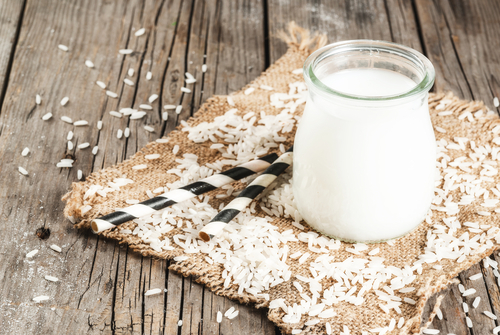
[ad_1]
If dairy meals hassle you otherwise you’re following a plant-based eating regimen, like our Bible-based Hallelujah Weight loss program to attain optimum well being wellness, you may marvel if rice milk is an effective different to cow’s milk or different plant milks. Figuring out the information about rice milk helps you make an knowledgeable choice about your well being!
Unsweetened Rice Milk Diet
The next is the macronutrient diet breakdown of a 1-cup portion of unsweetened rice milk:
Energy: 113
Protein: 1 gram
Carbohydrates: 22 grams
Fats: 2 grams
Fiber: 1 gram
Nutritional vitamins and minerals ample in rice milk embody calcium, vitamin D, vitamin B12, phosphorous, and vitamin A. Whereas many of those vitamins aren’t naturally present in rice or its milk, many rice milk producers add nutritional vitamins and minerals throughout processing to make rice milk akin to cow’s milk nutritionally.
Do-it-yourself Rice Milk Recipe
In the event you want making your personal rice milk at residence, do that Hallelujah Weight loss program do-it-yourself rice milk recipe! The substances in it are:
three cups of distilled water
1 cup of natural brown rice (soaked in a single day and drained)
Floor cinnamon (optionally available)
Vanilla (optionally available)
Maple syrup (optionally available)
Merely soak uncooked rice in water in a single day within the fridge, drain the rice, and mix it with water till it reaches a milk-like consistency. Add your favourite flavoring if you happen to’d like, chill, serve, and luxuriate in your rice milk!
Rice Milk vs. Cow’s Milk
The principle distinction between rice and cow’s milk is the protein and lactose content material. Rice milk doesn’t comprise lactose, so it’s simpler to digest than cow’s milk if you’re delicate to this pure sugar. Cow’s milk supplies about eight grams of protein per cup, whereas rice milk comprises just below 1 gram of protein in the identical portion. Rice milk is larger in carbohydrates. Cow’s milk diet info (for 1% cow’s milk) is as follows:
Energy: 105
Protein: eight grams
Carbohydrates: 12 grams
Fats: 2 grams
Fiber: zero grams
Professionals and cons exist for rice and cow’s milk, however each are wealthy in calcium, vitamin D, and different important nutritional vitamins and minerals.
Rice Milk vs. Different Plant Milks
Rice milk varies barely from different well-liked plant milks. Almond milk is often decrease in energy and carbohydrates than rice milk, whereas soy milk comprises extra protein and wholesome fats. The dietary breakdown of assorted plant milks is as follows:
Unsweetened Almond Milk:
Energy: 39
Protein: 1 gram
Carbohydrates: three grams
Fats: three grams
Fiber: 1 gram
Unsweetened Soy Milk:
Energy: 80
Protein: eight grams
Carbohydrates: four grams
Fats: 5 grams
Fiber: 1 gram
Unsweetened Coconut Milk:
Energy: 40
Protein: zero grams
Carbohydrates: 1 gram
Fats: four grams
Fiber: zero grams
Unsweetened Cashew Milk:
Energy: 25
Protein: zero grams
Carbohydrates: 1 gram
Fats: 2 grams
Fiber: zero grams
Unsweetened Hemp Milk:
Energy: 60
Protein: three grams
Carbohydrates: zero grams
Fats: 5 grams
Fiber: zero grams
Protein-Fortified Nut Milk:
Energy: 130
Protein: 10 grams
Carbohydrates: three grams
Fats: eight grams
Fiber: zero grams
Every of those non-dairy milks is normally wealthy in calcium, vitamin D, and vitamin A, or phosphorous. Apart from soy milk and protein-fortified plant milks (corresponding to protein-fortified almond milk), many plant milks comprise a lot much less protein than cow’s milk.
What About Rice Protein Powder?
Plant protein powders containing rice and pea protein (plus further fiber, nutritional vitamins, and minerals) make glorious additions to vegan meal plans. Combine these powders with water or plant milk so as to add further protein and different important vitamins to your eating regimen. The diet breakdown of 1 scoop of Hallelujah Weight loss program pea and rice protein powder is as follows:
Energy: 150
Protein: 25 grams
Carbohydrates: 6 grams
Fats: three grams
Fiber: 5 grams
Rice protein powder is a extra concentrated supply of vitamins. It’s a lot larger in protein and fiber (with fewer carbohydrates) than conventional rice milk.
Ought to I Select Rice Milk?
Switching from cow’s milk to rice milk can get rid of signs of lactose intolerance if in case you have it and decrease your consumption of hormones or antibiotics utilized in farming. Rice milk is an effective supply of carbohydrates, wholesome fat, calcium, vitamin D, and different important micronutrients, however if you happen to’re in search of a greater supply of protein akin to what’s in cow’s milk, take into account protein-fortified plant milk or add plant protein powder to conventional rice milk.
In the event you’re able to take management of your well being and stop ailments naturally the best way God meant, strive the completely plant-based Hallelujah Weight loss program! You’ll uncover all of the well being and wellness advantages this eating regimen affords. Get began totally free with the Hallelujah Weight loss program planner at present.
You Might Additionally Like:
The whole lot You Have to Know About Rice Milk
If dairy meals hassle you otherwise you’re following a plant-based eating regimen, like our Bible-based Hallelujah Weight loss program to attain optimum well being
Learn Extra
eight Water-Wealthy Meals That Assist You Keep Hydrated
Staying hydrated is a vital a part of staying wholesome. Whereas consuming water can simply meet this requirement, consuming plenty of
Learn Extra
Recommendations on Overcoming That Pesky Spring Chilly
Simply while you wished to sleep somewhat longer, a pesky robin celebrating the arrival of spring begins singing its
Learn Extra
[ad_2]
Supply hyperlink